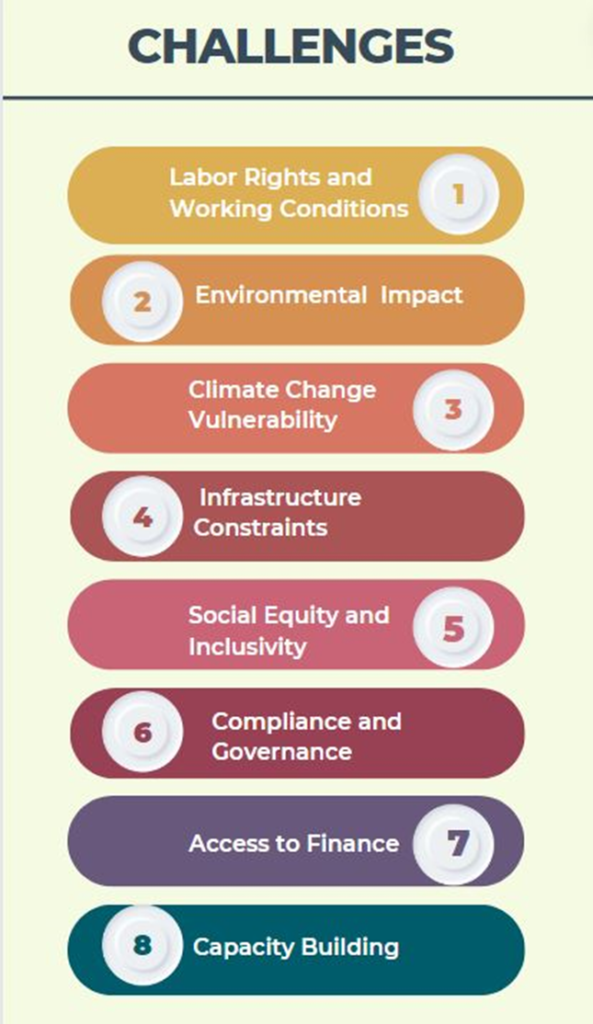The fashion industry, with its intricate web of global supply chains, has long been under scrutiny for its environmental impact. As consumers become more conscious of sustainability, brands and manufacturers are compelled to rethink their practices. In this context, Bangladesh, a major player in the garment industry, faces a critical wake-up call.
In the heart of South Asia, Bangladesh stands as proof of resilience and growth, particularly in the textile and garment industry. Over the past few decades, the country has emerged as one of the world’s leading exporters of apparel, contributing significantly to its economic development. However, with progress comes responsibility, and Bangladesh is now facing a critical wake-up call regarding the sustainability of its supply chains.
You can also read: Remittance: Bangladesh’s Financial Orchestra Force
The textile and garment industry, a cornerstone of Bangladesh’s economy, has propelled the nation onto the global stage. As the sector continues to flourish, concerns over environmental and social impacts are mounting. The need for a paradigm shift towards sustainable supply chains has become more pressing than ever, and Bangladesh finds itself at the crossroads of economic development and environmental responsibility.
Bangladesh’s Challenge for Sustainable Supply Chains
Bangladesh faces several challenges that serve as a wake-up call for sustainable supply chains. These challenges are critical in the context of the country’s economic development, social well-being, and environmental sustainability. Here are some key challenges Bangladesh faces:

Recommendations
In the wake of the need for sustainable supply chains in Bangladesh, several recommendations can be made to address the challenges the country faces. These recommendations aim to promote social responsibility, environmental stewardship, and economic sustainability. Here are some key suggestions:

The government, industry stakeholders, and civil society must come together to drive this transformation. Establishing incentives for sustainable practices, providing financial support for technological upgrades, and fostering a culture of corporate responsibility are integral components of this collaborative effort.
Global Supply Chain Sustainability in Global Context
Global supply chain sustainability is crucial for addressing environmental and social challenges. According to a 2021 report by the World Economic Forum, only 34% of global companies have comprehensive sustainability strategies in their supply chains. The carbon footprint of transportation and manufacturing processes remains a significant concern, contributing to climate change. Sustainable sourcing practices are gaining traction, with increased emphasis on ethical labor practices, reduced waste, and circular economy principles. Leading companies are incorporating sustainable criteria into supplier selection, influencing a shift toward eco-friendly practices. However, challenges persist, including regulatory variations, limited transparency, and resistance to change. The ongoing commitment to data-driven monitoring and collaboration among stakeholders is essential for fostering a resilient and environmentally responsible global supply chain system.
Renewcell’s Unexpected Demise
Recently, the Swedish recycling technology company Renewcell filed for bankruptcy, catching many by surprise. Renewcell had developed an innovative process that recycled cotton-rich clothing, such as jeans, into Circulose, a dissolving pulp used to create man-made cellulosic fibers (MMFCs). Fashion brands worldwide have expressed interest in these recycled fibers, and Renewcell has garnered significant attention. Brands like H&M, Levi’s, Zara, and others have committed to incorporating Circulose into their collections. Renewcell’s bankruptcy serves as a wake-up call for the entire fashion industry.
Bangladesh has an opportunity to lead by example, creating a blueprint for sustainable supply chains. Prioritizing environmental responsibility, ethical sourcing, and transparency. Only then can Bangladesh build a truly sustainable future, one where fashion doesn’t come at the cost of our planet.
Bangladesh’s Role
Bangladesh, as a major textile exporter, can play a pivotal role in reshaping supply chains.
Environmental Impact:
Sustainability means minimizing negative externalities. Bangladesh’s factories must address effluent management and reduce their direct impact on the environment.
Supplier Selection:
Brands should prioritize partnerships with progressive, sustainable suppliers. By supporting ethical practices, they contribute to a more responsible industry.
Transparency:
Transparency is crucial. Brands and manufacturers must openly communicate their sustainability efforts, allowing consumers to make informed choices.
Bangladesh stands at a critical juncture where it must balance economic development with environmental and social responsibility. The wake-up call for sustainable supply chains echoes not only within the borders of Bangladesh but resonates globally. By embracing sustainability, the country can ensure long-term prosperity, safeguard its environment, and contribute to a more ethical and responsible global supply chain. The time to act is now, and Bangladesh has the opportunity to lead the way towards a brighter, more sustainable future.


